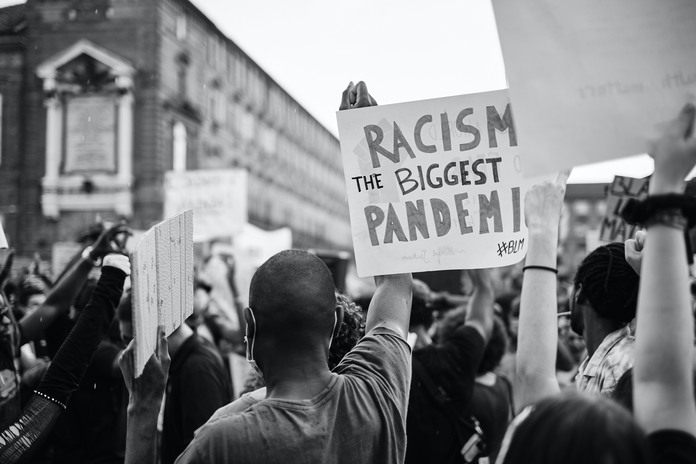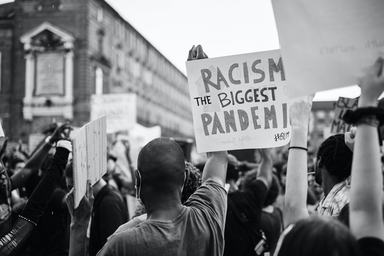As people have become more educated, the push for racial equality has only heightened as we are more aware of the systemic racism we are surrounded by. It’s clear that even sixty years after the civil rights movement, we have much more progress to make. People argue that under law, everyone is seen as equal thanks to anti discriminatory laws and the repeal of discriminatory practices such as Jim Crow laws. While we no longer live in a country that segregates public spaces by people’s skin color, we unfortunately do live in a country whose system thrives on the oppression of BIPOC, the LGBTQ+ community and disabled individuals.
Given the push for equality in general to be afforded to those who do not possess it in a system like ours, its not uncommon to see many BIPOC creators, such as one creator who refers to themselves as “Head of the Hoochies” being accused of “reverse racism.” Queen of the Hoochies, another name she goes by, has a growing platform on TikTok (@headoftheehoochies), Twitter (@_benjvmins_), and Instagram (@_benjamins_). I first stumbled upon them on TikTok, and quickly became a follower as they are a pro-sex work black creator who constantly calls out racist’s and misogynist’s while sharing stories and creating funny content.
Headofhoochies has grown in popularity over her names in reference to white people. Such as: “snow bunnies”, “snow roaches”, “snow possums”, etc. While many BIPOC find headofhoochies names towards white people funny, she’s come under fire from white women and men who accuse her of being racist towards them by using names like these. But is this “reverse racism”? Does reverse racism exist?
The short answer is: no. Reverse racism, much to some to white people’s dismay, is not a thing. The term instead is just proof of white people’s fragility and unwillingness to experience discomfort in order to push towards a more just society and system in the U.S.
In an article published mid 2020, Dr. Nicki Lisa Cole, dives into the difference between prejudice and racism. Dr. Cole has a Ph.D. in Sociology from the University of California, Santa Barbara. She explains that prejudice refers to a preconceived notion surrounding a group, whereas racism refers to the unequal distribution of power on the basis of race.
As an example, Nicki Cole refers to the stereotype surrounding blondes as being “dumb.” She explains that in sociology, stereotypes like those can be considered a form of prejudice as it can produce negative feelings, but not all prejudices are on the basis of race nor do they have racist consequences. So, since racism refers to the distribution of power, can someone calling a white person a “snow bunny” be considered racism? Following this logic, no. But, it can be prejudice.
The n-word is racial slur that reflects on the unjust hierarchy of skin color that places black Americans at a disadvantage and therefore negatively impacts them. Calling a white person by a derogatory name or referring to them in a derogatory manner, does not compare. For example, the word “cracker” when used to refer to a white person, actually holds no consequence to the individual’s life chance. It doesn’t have consequences because white people are at the advantage in the system. Therefore, calling a white person a cracker, snow bunny or any similar term, do not actually affect the power they would hold as they are the oppressor. A white person would not face any structural changes if they were to be called any of those names and as such, cannot be racism as it does not affect the amount of power they hold in the system. But, it can be prejudice.
So, if it can be prejudice, why do people use terms like cracker and snow bunnies? Simple. It’s called reparations. BIPOC have historically been oppressed and called derogatory terms such as the n-word, “beaner”, or “chink” in order to remind them of their position at the bottom of the racial hierarchy. White people are often referred to in derogatory ways in order to fight against their positions of power by putting them at the same level that they’ve placed BIPOC and other marginalized communities (LGBTQ+, disabled individuals and more).
Creators like headofhoochies, have started using terms like this in response to the hundreds of years their communities have been oppressed. While many don’t mind terms like snow owls in reference to white people, many people claim that terms like these should be refrained from use as they are instead turning discrimination towards others. But are they? A white person would realistically not be that affected by terms like this on a social level. While they might feel insulted or a bit offended it’s not having any actual structural affect.
White people’s fragility is apparent in so many ways; from the creation of the blue lives matter “movement” in response to Black Lives Matter to comments about how black history or Hispanic heritage month are anti-white. It is clear that white people will continue to try to paint themselves as innocent, ignore their privilege and continue to thrive off the oppression of others and it needs to stop.
African Americans, Asians, Hispanics, Latinos, Indigenous communities and more have been at the butt of systemic racism for hundreds of years. White people have always historically been the oppressor, and it’s quite hilarious that they cannot even bear a fraction of the discrimination, discomfort and pain that other communities have endured at their benefit.
So please, if you’re white, stop being so fragile. If being called a snow bunny upsets and discomforts you so much, reflect on how black Americans feel when their men and women are killed for no reason other than the color of their skin. Reflect on the children and parents separated at the border and placed into cages for trying to secure a better life. Think about the thousands of Japanese Americans placed into internment camps in the U.S. during World War II. You are not a victim, and its important white people acknowledge this if they truly wish to be an ally. Reverse racism does not and will never exist in a system that places white individuals at the top.


